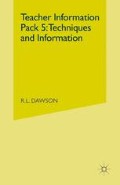Abstract
‘Informal Reading Inventories’ (IRIs) are a way of assessing a child’s reading without using a formal, published test and have been used for many years, more commonly in the USA. An IRI is in effect a structured observation of a child’s reading performance on passages selected by you from his everyday reading material. There are several advantages of an IRI over most standardised tests:
Preview
Unable to display preview. Download preview PDF.
Further Reading
Further information concerning the use of Miscue Analysis can be found in: Hittleman, D. R., Developmental Reading, Rand McNally, 1978.
Southgate, V., Arnold, H. and Johnson, S., Extending Beginning Reading, Heinemann, 1981.
Rye, J., Cloze Procedure and the Teaching of Reading, Heinemann, 1982.
Copyright information
© 1985 Macmillan Publishers Limited
About this chapter
Cite this chapter
Dawson, R.L. (1985). Informal Inventories. In: Teacher Information Pack 5: Techniques and Information. Palgrave, London. https://doi.org/10.1007/978-1-349-09005-1_4
Download citation
DOI: https://doi.org/10.1007/978-1-349-09005-1_4
Publisher Name: Palgrave, London
Print ISBN: 978-0-333-42502-2
Online ISBN: 978-1-349-09005-1
eBook Packages: Palgrave Social & Cultural Studies CollectionSocial Sciences (R0)

